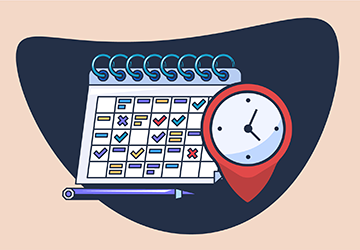Time management is an indispensable competency that profoundly enhances the lives of individuals across various demographics, irrespective of their career, age, or societal roles. Mastery of this skill facilitates individuals' achieving heightened productivity, augmenting their efficiency, and mitigating stress levels. The Importance of Time Management is predominantly illuminated as it enables optimal allocation of temporal resources across diverse tasks, ensuring maximal productivity and an enriched life quality.

Why Prioritize Time Management?
1. Boosts productivity: Proficient time management translates into a significant increase in output within condensed timeframes.
2. Decreases stress: Mastery in managing time efficaciously reduces the propensity to feel overwhelmed.
3. Augments work-life harmony: Astute time management helps cultivate a healthier equilibrium between professional obligations and personal pursuits.
Elevating Operational Efficiency with Proactive Strategic Planning
Strategies on How to Manage Time Effectively
Managing time effectively necessitates adopting methodologies and technological aids that transform routine activities into more productive endeavours.
The Essence of Prioritization
Commence by identifying quintessential tasks. This strategic focus enables you to channel your energies towards endeavours that substantially impact your objectives and personal contentment.
Strategic Planning
- Daily objectives: Formulate precise, achievable targets to steer your endeavours.
Weekly assessments: At the culmination of each week, reflect on your accomplishments and strategize for the forthcoming week.
Refining Task Allocation Mechanisms
Enhance workplace productivity by refining task allocation strategies. Cultivate a deep comprehension of team capabilities and strategically assign tasks leveraging individual proficiency and workload considerations. This refined approach guarantees heightened engagement and productivity, markedly elevating overall output.
Instituting Robust Accountability Frameworks
Forge durable accountability frameworks within teams to ensure all members adhere to their time management obligations. Implement regular progress reviews and milestone-based assessments to maintain project alignment and motivate individuals, thus nurturing a culture of responsibility and superior performance.
Cultivating Mental Resilience and Enhanced Concentration
Implementing Mindfulness and Concentration Enhancement Programs
Introduce mindfulness programs instructing methods to bolster concentration and manage occupational stress. These practices empower employees to sharpen their focus, improving time management and elevating productivity.
Crafting Environments Conducive to Focused Work
Engineer office spaces that promote sustained concentration and minimize disruptions. Incorporate ergonomic design elements, sound-dampening solutions, and thoughtful spatial arrangements to boost focus and operational efficiency substantially.
Innovating Metrics for Assessing Time Management Efficacy
Creating Bespoke Performance Metrics
Craft bespoke performance metrics tailored to evaluate the organization's efficacy of time management tactics. These metrics include the proportion of time dedicated to impactful activities versus administrative duties or the balance between scheduled and unscheduled tasks.

Exploiting Big Data for Enhanced Time Resource Management
Employ extensive data analysis to extract more profound insights into time utilization across various organizational sectors and projects. Such comprehensive data examination can reveal patterns and trends that inform more strategic resource distribution and process management decisions.
By persistently innovating and implementing these advanced methodologies, organizations can significantly increase their operational efficiency and productivity, foster a healthier work environment, and support sustainable business practices.
Technological Aids for Enhanced Time Management
Exploiting cutting-edge tools can significantly bolster time management efficiency. Digital tools such as calendars, reminders, and sophisticated task management software are instrumental in keeping you aligned with your schedule.
Incorporating Predictive Scheduling Technologies
Embrace predictive scheduling technologies that autonomously modify tasks and priorities in response to real-time operational shifts. These systems utilize advanced predictive analytics to anticipate disruptions and preemptively restructure schedules, ensuring seamless operational flow.
Capitalizing on AI and Automation
Harness the power of artificial intelligence (AI) and automation to assume control over monotonous tasks. State-of-the-art technologies like automated email categorization, voice-activated assistants, and sophisticated scheduling algorithms can recuperate countless hours weekly, diverting attention to more intricate projects.
Advancing Mobile Time Management Integration
Promote the adoption of mobile time management applications that enable team members to organize their agendas remotely. These applications facilitate synchronization across various devices, delivering essential updates and notifications crucial for sustaining productivity in a digitally dominated environment.
The Pomodoro Technique
This technique entails intense focus periods of 25 minutes, succeeded by a brief respite of 5 minutes. These intervals, termed 'Pomodoros', culminate in a lengthier break of 15-30 minutes after every four cycles, sustaining concentration and averting mental fatigue.
Method of Time Blocking
Time blocking involves dedicating specific chronological segments to disparate tasks or activities. This strategy ensures that significant tasks receive dedicated attention and facilitates more methodical day structuring.
Eisenhower Matrix
This analytical tool aids in evaluating and prioritizing tasks by delineating them based on urgency and significance. It thereby filters out less critical tasks that should either be delegated or not undertaken at all.
Fostering Sustainable Operational Practices
Advocating for Eco-Conscious Time Management
Initiate time management practices that enhance efficiency and support environmental sustainability. Opt for virtual over physical meetings to diminish travel demands and lower carbon emissions, aligning with eco-responsible corporate values.
Conducting Thorough Time Management Evaluations
Periodic time management evaluations can pinpoint inefficiencies and potential areas for enhancement. These evaluations should analyze time expenditure relative to achieved outcomes, providing critical insights that drive more efficacious planning and resource allocation.
Optimizing Productivity Through Strategic Scheduling
Exploiting the Potential of Delegation
Strategically delegating tasks is paramount in effectively optimizing one's temporal resources. Delineating responsibilities that others can efficiently handle not only liberate time for more critical pursuits but also amplifies team capabilities and facilitates developmental opportunities.
Enforcing Rigorous Deadlines
Establishing stringent, unequivocal deadlines for each task can catalyze focus and enhance the performance of individuals and teams. Such deadlines compel a dedication to completing tasks within set parameters, mitigating the risk of incomplete tasks.
Conclusion
Mastering time management is pivotal for anyone aspiring to elevate their productivity, reduce stress, and achieve a harmonious lifestyle. By deeply understanding the Importance of Time Management and mastering How to Manage Time Effectively, individuals can ensure that their temporal investments are directed towards the most fruitful pursuits. Remember, time is an irreplaceable asset, and your stewardship over it can decisively shape the calibre of your life.
Adopting these strategies amplifies productivity and profoundly influences personal and professional development. Whether you are a student, a professional, or simply someone eager to refine your time management skills, these methodologies can be tailored to accommodate your specific circumstances and schedule.




